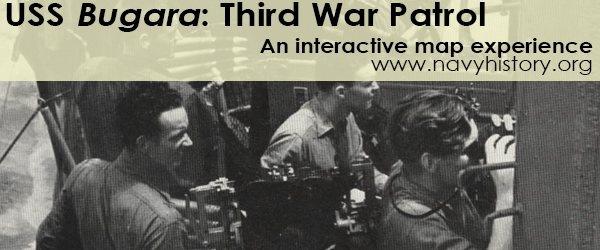
“And this we planned as a quiet day.” (USS Bugara Ship Log, 29 July 1945)
USS Bugara (SS 331), one of 120 Balao-class submarines completed during the war, was launched on 2 July 1944 by Electric Boat Company in Groton, CT. Commander A.F. Schade was the first commanding officer.
Her service from 21 February to 17 August 1945 proved to be one of the more interesting records of events from Balao-class ships. During that time, she conducted three war patrols in the Flores, Java, and South China Seas and the Gulf of Siam. Bugara’s first two war patrols were relatively routine with minimal interference.
In the span of just over one month, Bugara’s crew sank fifty-seven small enemy ships totaling 5,284 tons (12 junks, 24 schooners, 16 coasters, and 3 sea trucks). Respecting the rules of war, Bugara made sure to put native crews safely ashore before sinking their vessels. In many cases, foreign crew members were cordial to Bugara’s crew. As a result, they thoroughly disrupted the Bangkok-Singapore route of supplies for the Japanese.
Other engagements made this particular patrol particularly noteworthy. On 2 August 1945, Bugara’s crew encountered a Japanese ship manned by a Chinese crew being attacked by Malayan pirates. Bugara rescued the Chinese, sank the ship, and successfully attacked the pirates. Here is an excerpt from the official report on 2 August (6-21 N, 102-20 E):
“1320 – Contact #46 – A new 150-ton schooner, anchored in deep water. Suspected something funny here. As we approached, we saw 6 large Malay canoes close by. It developed that it was a Chinese crew on a Jap vessel carrying rice to Singapore under attack by Malay pirates. We took off the Chinese crew and their life boat. The pirates fled. We sank the Jap ship, then shot up all the pirates and their boats. Put the Chinese ashore – and they love us still, inasmuch as the pirates had already killed two of the crew.”
Following her return to Fremantle, Australia, at the conclusion of her third patrol in mid-August, she sailed to Subic Bay where she operated for the remainder of the war. For her wartime service, Bugara received three battle stars.
How to Read the Third War Patrol Map:
Follow the travels of Bugara throughout her third war patrol from Subic Bay to Freemantle, Australia. Each plot point represents a lat-long measurement made by Bugara crew members between 14 July and 17 August. All spelling and colloquialisms were unchanged to maintain an accurate record of their patrol. The plot points are color-coded based on what happened on that particular date and time:
• Green – Status OK/Normal operations
• Yellow – Ship/Plate Spotted, but no enemy action
• Red – Enemy Action
Below the map is a complete list of tonnage and cargo sunk by Bugara during her third war patrol.
Source Information: USS Bugara, Third War Patrol, Donation of EMC(SS) John Clear, USN, found digitally at HNSA and available in the Navy Department Library catalog.
Summary of Vessel and Tonnage Sunk by Bugara
DATE
SHIP TYPE
TONNAGE
CARGO
7/24/45
Schooner
50
airplane wheels and tires, 15 cases of airplane parts.
7/24/45
Junk – HIAP SENG MARU
120
sugar and sewing machines
7/24/45
Coaster
25
sugar for Japanese
7/24/45
Coaster
25
sugar for Japanese
7/25/45
Schooner
75
50 tons of rice
7/25/45
Junk
25
sugar and matches
7/25/45
Schooner
51
sugar and coffee
7/25/45
Junk – KIAN HUAT
50
sugar
7/25/45
Schooner – JOO LEE MARU
120
sugar and miscellaneous stores
7/25/45
Coaster
20
empty
7/26/45
Trengannu
20
N/A
7/26/45
Junk – CHIT MING HO MARU
144
75 tons of rice
7/26/45
Sea Truck
50
drums of aviation gasoline
7/26/45
Schooner
75
50 tons of rice
7/26/45
Schooner
50
medical supplies, scrap iron, and rice
7/27/45
Schooner
20
miscellaneous gear
7/27/45
Schooner
75
50 tons of sugar
7/27/45
Schooner
200
150 tons of rice
7/28/45
Coaster
50
rice
7/28/45
Coaster
50
rice
7/28/45
Schooner
300
n/a
7/28/45
Schooner – KIAT ANN
75
sugar
7/28/45
Chusan-type Junk
25
rice
7/29/45
Schooner
200
200 barrels of sorghum molasses
7/29/45
IJN Auxiliary
400
cocoa bean
7/29/45
Junk – AYAMA
112
rice
7/29/45
Schooner
50
rice
7/30/45
Coaster
30
sugar
7/30/45
Schooner – TWAKO
29
sugar
7/30/45
Sea Truck
50
rice
7/31/45
Coaster
32
n/a
7/31/45
Schooner
40
rice
7/31/45
Schooner
100
rice and salt
7/31/45
Coaster
37
sugar
7/31/45
Coaster
33
rice
8/2/45
Schooner
211
miscellaneous gear
8/2/45
Coaster
20
coffee
8/2/45
Schooner
180
n/a
8/2/45
Coaster
18
rice
8/2/45
Schooner
117
rice
8/2/45
Schooner
150
n/a – hijacked by Malayan pirates
8/3/45
Sea Truck
56
rice
8/3/45
Japanese Junk No. 2218
100
45 tons of rice
8/4/45
Coaster
50
rice
8/4/45
Junk
300
rice
8/4/45
Schooner
450
copra and coconut oil
8/5/45
Schooner
200
coffee, sugar, sewing machines, and other gear
8/5/45
Junk
75
copra and rattan
8/5/45
Coaster
20
n/a
8/5/45
Schooner
64
coffee
8/6/45
Junk
125
sugar and rice
8/6/45
Coaster
16.6
miscellaneous gear
8/6/45
Junk
26
sugar
8/6/45
Junk
60
rice
8/7/45
Junk
60
rice
8/7/45
Coaster
26.5
n/a
8/7/45
Coaster
28
rice

